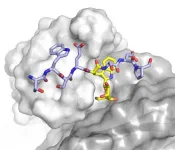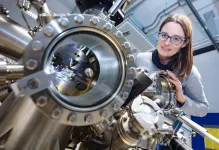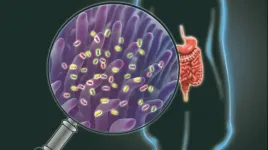Spicy perfection isn't to prevent infection
This is the chef's kiss of scientific discovery
2021-02-04
(Press-News.org) The next time you tuck in to a tikka masala you might find yourself asking a burning question: are spices used in dishes to help stop infection?
It's a question many have chewed the fat over. And now thanks to new research from The Australian National University (ANU) we have an answer.
The quick takeaway is: probably not.
Professor Lindell Bromham and her colleagues asked why hot countries across the world tend to have spicy food? This pattern has led to what some have termed "Darwinian gastronomy" - a tummy-led cultural evolutionary process in countries with hotter climates.
To find out the answer to their question, the researchers feasted on a true smorgasbord of data, examining more the 33,000 recipes from 70 cuisines containing 93 different spices.
"The theory is that spicy foods helped people survive in hot climates where the risk of infection from food can have a big cost in terms of health and survival," Professor Bromham said.
"But we found that this theory doesn't hold up.
"Spicier food is found in hotter countries, but our analysis provides no clear reason to believe that this is primarily a cultural adaptation to reducing infection risk from food."
The study instead shows that while use of spice is related to the risk of foodborne illness, it's also associated with a wide range of health outcomes. In fact, spice use is even related to causes of death that have nothing to do with infection risk, such as fatal car accidents.
"So there is a significant relationship between life expectancy and spicy food," Professor Bromham said.
"But this doesn't mean that spicy food shortens your life span or makes you crash your car. Instead, there are many socioeconomic indicators that all scale together, and many of them also scale with spice use."
Professor Bromham said that because the spiciness of cuisines scales with many socio-economic factors, like gross domestic product per capita and life expectancy, it is difficult to tease apart the key causes. However, the researchers could rule out some possible explanations of why some areas use more spices in their cooking.
"Spicier foods are not explained by variation in climate, human population density or cultural diversity," she said.
"And patterns of spice use don't seem to be driven by biodiversity, nor by the number of different crops grown, nor even by the number of spices growing naturally in the area."
Whatever the key drivers for the use of spice, one thing is certain - our palettes and plates are a lot better for it!
The study's findings are published in Nature Human Behaviour.
INFORMATION:
ELSE PRESS RELEASES FROM THIS DATE:
2021-02-04
You might remember you ate cereal for breakfast but forget the color of the bowl. Or recall watching your partner put the milk away but can't remember on which shelf.
A new Northwestern Medicine study improved memory of complex, realistic events similar to these by applying transcranial magnetic stimulation (TMS) to the brain network responsible for memory. The authors then had participants watch videos of realistic activities to measure how memory works during everyday tasks. The findings prove it is possible to measure and manipulate realistic types of memory.
"On a day-to-day basis we must remember complex events that involve many elements, such as different locations, people and objects," said lead author Melissa Hebscher, a postdoctoral fellow ...
2021-02-04
New tools and methods have been described by WEHI researchers to study an unusual protein modification and gain fresh insights into its roles in human health and disease.
The study - about how certain sugars modify proteins - was published today in Nature Chemical Biology. Led by WEHI researcher Associate Professor Ethan Goddard-Borger, this work lays a foundation for better understanding diseases like muscular dystrophy and cancer.
At a glance
WEHI researchers have developed new tools and methods to determine how 'tryptophan C-mannosylation', an unusual protein modification, impacts the stability and function ...
2021-02-04
In order to produce tiny electronic memories or sensors in future, it is essential to be able to arrange individual metal atoms on an insulating layer. Scientists at Bielefeld University's Faculty of Chemistry have now demonstrated that this is possible at room temperature: molecules of the metal-containing compound molybdenum acetate form an ordered structure on the insulator calcite without jumping to other positions or rotating. Their findings have been presented in the Nature Communications journal. The work was done in cooperation with researchers from the universities of Kaiserslautern, Lincoln (UK) and Mainz.
'Until now, it has been difficult ...
2021-02-04
A healthy person has a general balance of good and bad bacteria. But that balance is thrown off when someone gets sick. So, to help boost their levels of good bacteria, many people take probiotic supplements -- live bacteria inside of a pill. Various commercial probiotic supplements are available for consumer purchase, and while health experts generally agree about their overall safety, controversy surrounds their efficacy.
Inside the human body lives a large microscopic community called the microbiome, where trillions of bacteria engage in a constant "tug of war" to maintain optimal levels of good and bad bacteria. Most of this struggle takes place within the body's gastrointestinal tract, as bacteria help with digesting food and support the immune system. Although ...
2021-02-04
New research carried out by City data scientist, Dr Andrea Baronchelli, and colleagues, into the dark web marketplace (DWM) trade in products related to COVID-19, has revealed the need for the continuous monitoring of dark web marketplaces (DWMs), especially in light of the current shortage and availability of coronavirus vaccines.
In their paper, Dark Web Marketplaces and COVID-19: before the vaccine published in the EPJ Data Science journal, Dr Baronchelli and his colleagues analysed 851,199 listings extracted from 30 DWMs between January 1, 2020 and November 16, 2020 before the advent of the availability of the coronavirus vaccine.
They identify 788 listings directly related to COVID-19 products and monitor the temporal evolution of product categories including Personal Protective ...
2021-02-04
Researchers from the University of Missouri School of Medicine have discovered that children who receive a seasonal flu shot are less likely to suffer symptoms from a COVID-19 infection. The finding comes from a review of more than 900 children diagnosed with COVID-19 in 2020.
"It is known that the growth of one virus can be inhibited by a previous viral infection," said Anjali Patwardhan, MD, professor of pediatric rheumatology and child health. "This phenomenon is called virus interference, and it can occur even when the first virus invader is an inactivated virus, such as the case with the flu vaccine."
Patwardhan reviewed records from 905 pediatric patients diagnosed with COVID-19 between February and August 2020 to determine each patient's influenza vaccination history. ...
2021-02-04
Cardiac patients who also have diabetes will be able to do their rehabilitation exercises more safely, thanks to the world's first guidance on the subject, which has been published by international experts including a Swansea University academic.
The guidance will be a crucial resource for healthcare professionals, so they can help the growing number of cardiac rehabilitation patients who also have diabetes.
The guidance, approved by international diabetes organisations, was drawn up by a team including Dr. Richard Bracken of the School of ...
2021-02-04
Scientists at Bielefeld University's Faculty of Physics have succeeded for the first time in imaging the SARS-CoV-2 coronavirus with a helium ion microscope. In contrast to the more conventional electron microscopy, the samples do not need a thin metal coating in helium ion microscopy. This allows interactions between the coronaviruses and their host cell to be observed particularly clearly. The scientists have published their findings, obtained in collaboration with researchers from Bielefeld University's Medical School OWL and Justus Liebig University Giessen, in the Beilstein Journal of Nanotechnology.
'The study shows that the helium ion microscope is suitable for imaging coronaviruses - so precisely that the interaction between virus ...
2021-02-04
People undergoing long-term dialysis are almost 4 times more likely to die from COVID-19 and should be prioritized for vaccination, found a new Ontario study published in CMAJ (Canadian Medical Association Journal).
"As the COVID-19 pandemic proceeds, focused efforts should be made to protect this population from infection including prioritizing patients on long-term dialysis and the staff treating them for SARS-CoV-2 vaccination," writes Dr. Peter Blake, provincial director, Ontario Renal Network, Ontario Health, and professor, Schulich School of Medicine and Dentistry, Western University, ...
2021-02-04
It is necessary to develop additional COVID-19 vaccines, as different vaccine approaches have their advantages and disadvantages and may work synergistically. Researchers at Karolinska Institutet in Sweden now report that they have developed a prototype vaccine against SARS-CoV-2 using a DNA vaccine platform that is inexpensive, stable, easy to produce, and shows a good safety profile. A study published in Scientific Reports shows that the vaccine induces potent immune responses in mice.
The vaccine, called DREP-S, is administered as DNA and is based on a DNA-launched self-amplifying RNA (DREP) platform developed at Karolinska ...
LAST 30 PRESS RELEASES:
[Press-News.org] Spicy perfection isn't to prevent infection
This is the chef's kiss of scientific discovery





